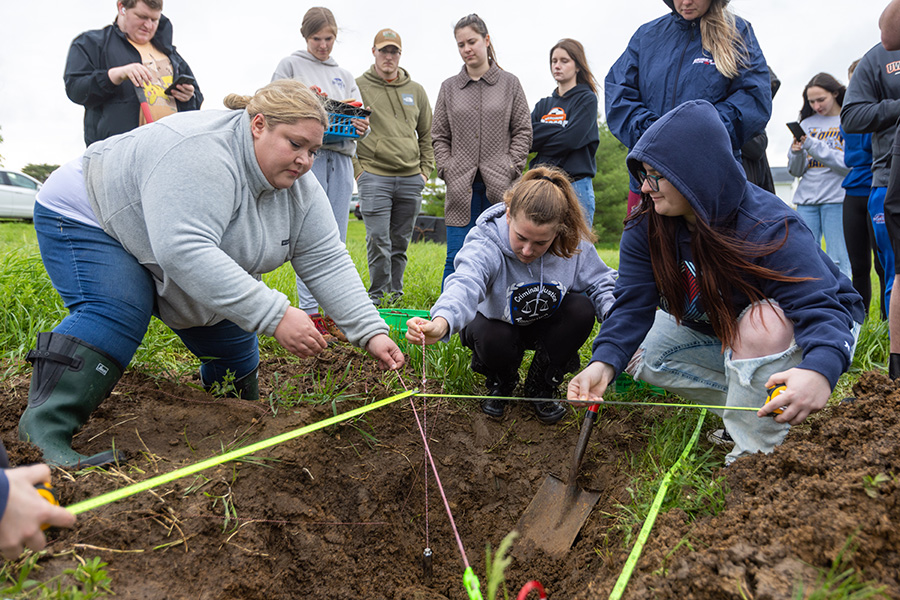
Forensic anthropologist Dr. Janamarie Truesdell working with students at the Forensic Investigation Research Facility, a 1.5-acre fenced area designed for practical training and research.
TV shows like NCIS and CSI: Crime Scene Investigation have popularized forensic investigation. For students considering a career in this field, a degree from UW-Platteville is an affordable investment in a future filled with ample job opportunities. UW-Platteville’s Department of Criminal Justice and Forensic Investigation is the first and only public institution in Wisconsin to offer a Bachelor of Science in Forensic Investigation, featuring the only medicolegal death investigation as an emphasis in the region. The university’s hands-on facilities ensure that graduates are well-prepared to make meaningful contributions to the field.
“The Forensic Investigation Crime Scene House played a significant role in my decision to come to UW-Platteville,” said junior Rowynn Whyte from Streamwood, Illinois, who is pursuing a degree in forensic investigation with a crime scene emphasis. “When I toured the facility, I was impressed by the quality of resources available and there’s nothing like it in the entire state. Training in such an immersive environment will give me a leg up when I graduate.”
The Forensic Investigation Crime Scene House (FICSH) just off campus is designed to simulate real-life crime scenes. It features a fully wired first floor, basement and exterior, equipped with closed-circuit digital video systems for live monitoring and critique. One-way mirrors also allow for professors to observe students discreetly on-site, enhancing their learning experience.
“The Forensic Investigation Crime Scene House is like a stage or theater, serving as a dynamic teaching lab,” said Dr. Will LeSuer, chair of the Department of Criminal Justice and Forensic Investigation. “It’s the hands-on components, the materials and all the tools that set our program apart. It’s not just pictures on a screen. The property around the house also allows for an ‘only at UW-Platteville’ opportunity for our students.”
UW-Platteville is home to the Forensic Investigation Research Facility, a 1.5-acre fenced area designed for practical training and research. This facility provides opportunities for mock crime scene investigations, including gravesite excavation and scenario training. It also supports research into the effects of climate on body decomposition, a distinctive aspect of the program. Most faculty members have current or prior law enforcement experience, bringing real-world insights to the classroom.
“I teach death investigation to students because I believe no matter what area of expertise you go into in law enforcement, people should understand the intricacies of the craft,” said forensic anthropologist and assistant professor Dr. Janamarie Truesdell. “When arriving at a scene, preserving it is crucial for the medical examiner to determine the cause of death. Understanding the role of science in recognizing, documenting and collecting physical evidence is essential.”
Truesdell is the consulting anthropologist for the counties of Kenosha, Racine, Walworth and Waukesha in southeast Wisconsin. Truesdell recently helped identify a John Doe who was murdered in Kenosha County in the early 1990s. She’s been to hundreds of death scenes and understands the need for realism, especially in a classroom environment. Truesdell conceived of a world-first advancement in forensic training: a new scene dummy equipped with thermo-chrome paint that simulates blanching livor mortis. This revolutionary tool offers students an unprecedented opportunity to accurately assess the time of death based on livor mortis—a key element in medical death investigation.
“A significant component of our Medicolegal Death Investigation class is determining the time of death through signs like livor mortis,” said Truesdell. “I saw the need for this kind of dummy, but nothing like it existed. I reached out to the team at Dapper Cadaver and the collaboration began.”
To create this dummy, Dapper Cadaver, a Madison-based prop company known for its realistic training dummies, integrated thermo-chrome paint to mimic the blanching effect observed in real-life forensic scenarios. The dummy allows students to test and measure capillary refill times, providing them with a tangible understanding of how long a body has been deceased based on how quickly the skin regains color after being pressed.
“Previously, students had to imagine these conditions during training,” said Truesdell. “This new dummy allows them to interact with a realistic simulation, making their learning experience more immersive and effective.”
Truesdell’s Forensic Firsts class is also providing students with a deeper knowledge while earning a degree in forensic investigation.
“I hope to become a death investigator or specialize in fingerprinting and possibly work for the FBI after I graduate,” said junior Casey Vandehey from Appleton, Wisconsin. “What I love about Dr. Truesdell’s class is that we explore the origins of crime and understand how its various components have evolved over time. It’s fascinating to see how much things have changed and adapted to help us.”
Truesdell invites students to assist her in examining cases she’s called to, providing unique and important training that helps UW-Platteville graduates stand out in a competitive field of applicants.
“After conducting several interviews, UW-Platteville graduates were easy to spot,” said Ryan Orlovsky, Police Forensics Services director, Milwaukee Police Department. “They were all well prepared for the interview and articulated their responses clearly and concisely while accurately answering the questions to the interview panel members. The Milwaukee Police Department Forensics Division was lucky to hire seven Platteville alumni so far in 2024.”
Forensic investigation is rapidly emerging as one of the fastest-growing specializations within criminal justice. With this groundbreaking addition of the livor mortis dummy to its training resources, UW-Platteville continues to lead the way in forensic education and innovation.
“Education in forensic investigation and criminal science is critical for those who want to make a difference in public safety and justice,” LeSuer concludes. “At UW-Platteville, we’re proud to offer programs that not only educate but also inspire our students to achieve excellence in their careers.”
Written by Christine Bellport
Link to original story: https://www.uwplatt.edu/news/how-training-dummy-demonstrates-degree-forensic-investigation-wise-choice-uw-platteville
